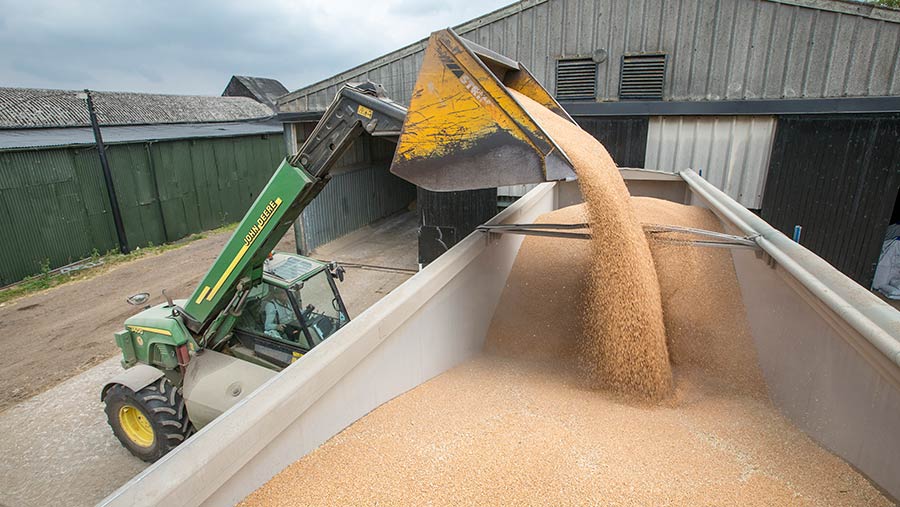Group of merchants team up to oppose digital grain passports
 © GNP
© GNP A group of 17 grain merchants have teamed up to voice their concerns with the business case for digital passports for combinable crops.
An ongoing industry-wide consultation, to determine whether the industry should replace paper grain passports with digital ones, is due to close on 2 February.
The group of grain merchants, which are thought to account for about a quarter of the total UK tonnage, have said they feel they are not being listened to, and are frustrated with the “done deal” mindset of the consultation.
See also: Deadline nears to have say on digital grain passports
It also suggests that the business case for the project understates the costs and risks of digital passports and overstates the cost of the existing paper system.
The group have collaborated to place adverts in the farming press raising their practical concerns with the project, stating it was “fighting for fairness at farmgate”.
Key concerns
Farmers Weekly spoke to a number of the merchants involved to gain a better understanding of the concerns raised.
The key concerns were that it could:
- Lead to further consolidation in the grain sector
- Be undermined by poor signal coverage in rural areas
- Cost farmers and merchants more money
- Be at risk of hacking.
One merchant involved said: “The reason that advert has gone in is because the consultation has been a whitewash – the mindset is that it is going to happen regardless.”
“The risks that are going to be put on a basic supply of food are just being ignored, just like with the Horizon scandal [at the Post Office], or when the passport system at airports was hacked last year.
“We are creating this thing that is going to cost a lot more money than they are declaring to do a less efficient job. The issue is that, bluntly, it is a system that is incredibly simple and it works at the moment.”
Internet access
Another merchant added: “Physically, I just don’t see it working. You very rarely get a phone signal in rural areas, let alone an internet signal.
“The current system is cheap, it works, and there’s never been an issue, so why change it? It’s not one company saying it’s a bad idea. It’s a whole group.
“Numerous companies we have dealt with recently have been hacked and haven’t been able to give information for weeks, if not months.”
A number of other merchants were also reportedly opposed to the introduction of the passports, but chose not to be named in the advert due to fear of future reprisals by other industry players.
However, other grain traders have argued a digital system would benefit merchants and growers by providing more accessible real-time data.
Funding concerns
One of the major sticking points between involved parties is how the project would be funded, with some arguing that it should not be levy-funded.
If it does move forward, the leadership group is expected to ask the AHDB Cereals and Oilseeds sector council for funding for the development stage.
However, the AHDB has not yet committed to this and will make a decision at the time.
An AHDB spokesperson said: “We can’t give our opinions on the business case as it is for the industry, not AHDB, to decide.
“Funding will be considered once we know whether the industry wants to proceed with the proposals, and we can’t comment any further before then.”
Industry response
The Digital Passport Leadership Group responded to the advert placed in the farming press by the group of merchants saying as a group they were pleased these issues and questions are being raised.
A statement said: “All users of the passport system are open to engage with this process and, as the industry group which has developed the business case, we can guarantee that all questions posed will be thoroughly addressed.
“There have been a number of meetings to build and consider the areas of detail within the business case over the past 12 months. These meetings have been attended by all in the supply chain, including farmers, hauliers, merchants, processors, and data experts.
“The purpose of this consultation is to ask questions of the business case, to sense-check and challenge the proposals held within. It is heartening to see that these outcomes are being achieved.
“The industry-wide consultation for the implementation of a digital passport for combinable crops ends on 2 February. Once this ends, the industry Leadership Group and supporting groups focused on data governance and system development will update the business case based on feedback received. If there is consensus to proceed, the Leadership Group will then approach AHDB and potentially other sources of funding.
“All farmers and industry businesses are welcome to feed into the consultation process and we look forward to hearing more.”
A spokesperson for the Agricultural Industries Confederation (AIC) added: “Since November, AIC has been encouraging its members in the animal feed, arable marketing and seed sectors, as well as scheme participants, to review the business case for a digital passport and share constructive feedback during the industry-wide consultation.
“AIC is listening carefully to the range of views received and will use this feedback to inform its consultation response on behalf of the agri-supply industry.”
